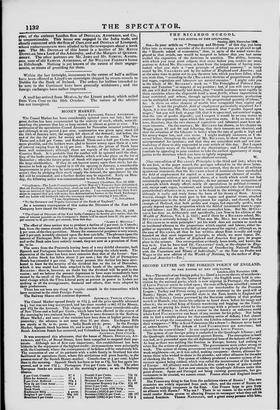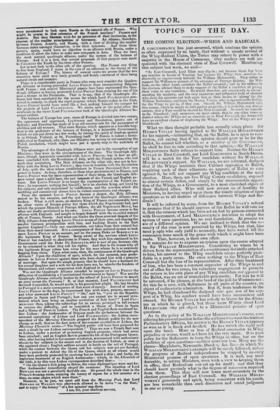SECOND LETTER ON THE FOREIGN POLICY OF ENGLAND.
TO THE EDITOR OF THE SPECTATOR.
London, 25th November 1836.
Si ft—The result of our foreign policy is—DonICARLOS on the eve of overthrow- ing the throne of our ally the Queen of Spain ; the English name held in exe- cration by the national party, which is now reigning in Portugal ; the alliance of Louts PHI Lir not to be relied upon ; the state of Belgium unsettled ; some of the best markets of Germany shut against our merchandise by the Prussian League ; Turkey and Persia owing a precarious existence to the good-will of Russia ; Egypt, the only powerful state in the East, hostile to England and friendly to Russia ; Greece governed by the Bavarian soldiers of that profane wretch at Munich, who forces his subjects to kneel down before his image and adore it ; the so-called King of Greece wandering and begging on the Conti- nent, and we paying his dowry for his marriage with a princess related to the Emperor of Russia; in short, not a corner in the known or unknown world where Lord PA L3IERSTON can boast of any success for his policy. Not being able to find a suitable phrase for that unending series of defeats, I feel almost tempted to adopt the conundrum which the London tobacconists now print on their wrappers—" Why is Lord Palmerston like a drum ?—Because never heard of, unless beaten." The defeats of Lord PALMERSTON are notorious; but where lies the cause of them? In one single person, Lours Punic. The system of our foreign policy is embodied in the Quadruple Alliance ; and the Quadruple Alliance was conceived against Russia. The conception in itself was bad, as it proceeded upon the old diplomatical base of the balance of Europe. As long as there was nothing like freedom in Europe, history had nothing to relate but the actions of governments. The governments were either strong or weak. The system of strong government consisted in regularly plundering its weak neighbours—or, as it was called, making conquests: thence, alliances be- tween those who wished to share in the plunder, and other alliances for the sake of checking the first. The system of robbery produced a counter-system of in- surance against being robbed, which was called the maintenance of the balance of Europe. All alliances were included in this, under a hope of gain or under the impression of fear. Let us now examine the Quadruple Alliance under this point of view. Spain and l'ortugal not being existing governments, but go.. vernments to be created, we cannot count. France alone and England deserve consideration. Has France any thing to fear from the ambitious views of Russia ? The two countries are widely separated from each other, and the views of Russia are directed to making conquests in the East. Can France hope to gain from an alliance with Russia ? Why not ? There is no reason in the world which could render Russia averse to allowing France to reconquer what they calk its natural frontiers. Thence NAPOLEON, and a great many persons with buns were accustomed to look upon Russia as the natural ally of France. Who might be averse to that extension of the French territory? Prussia and Austria. But they likeutiee wish for an extension of their territories, at the expenee of the smaller principalities of Germany. An alliance, therefore, between France, Austria, and Russia, with a view of dividing the smaller German states amongst themselves, is for their interests. And these three powers, again could have no objection to an alliance with Russia, under a condition to allow the latter to make new conquests in Asia. Thus we have the most natural quadruple alliance, under the system of the balance of Europe. And it is a fact, that several proposals of that purport were made to CHARLES the Tenth by the three other Powers.
Let us now look to the other side of the question. Has France any thing
to fear from England, I mean in the eyes of an adherent to the theory of the balance of Europe ? The history of several centir les .proves that the two countries were until very lately generally and firmly convinced of their being natural rivals and enemies.
There is a considerable party in France who even no' e consider the Quadru-
ple Alliance as having prevented Louis PHILIP from incorporating Belgium witb France : and several Ministerial papers here have represented the Qua- druple Alliance as having prevented Louis Piimie from creating for one of his sons a throne in the Peninsula. That is to say, that if the Quadruple Al- Rance had been concluded for the reason for which Lord PALMERSTON con- ceived it, namely, to check the rapid progress which Russia makes in the East, Louis Pinup would have acted like a fool, making himself the catspaw for the projects of Lord PALMERSTON. We arrive now at the point when the confusion in the views Lord PALMERSTON took of the Quadruple Alliance be- comes evident.
The balance of Europe has now, since all Europe is divided into two camps, the oppressors and oppressed, Legitimacy and Revolution grown out of fashion ; and Freedom has made of it an old nursery-tale for the amusement of children and old women. That same Russia, which appears as a horrible bug- bear to the professors of the balance of Europe, is a miserable Government, which we can put down in a few weeks by raising the spirit of freedom against
it in Poland, Finland, or St. Petersburg itself. If Russia is indeed a formi- dable rival to England, why, then, our Ministry was wrong in not sustaining the Polish revolution, which might have put a speedy stop to the ambition of Russia.
The advantages of the Quadruple Alliance were not in the conception of our
Ministry ; they were in the circumstances of the time. The Quadruple Alli- ance, though apparently concluded with Louis PHILIP, was in fact an alli- ance concluded with the Revolution of July, with the French nation, who had made that revolution. The Holy Alliance, on the other side, was not in hos- tility with the King Louis PRIMP ; they were in hostility with the Revolution of July, with the ideas whose establishment in France threatened their own power at home. As long, therefore, as those ideas predominated in Trance, and Louis PHILIP was the mere representative of those ideas, the Quadruple Alli- ance rested upon a solid base, the seal interests of the French and linglish ea- tions. But Louis Primp is no longer the representative of the French na- tion; he represents nothing but himself; he is an absolute King, not loved by his subjects, and only maintained by indifference, and the aversion which the middling and commercial classes have to violent commotions and changes. From the moment Louis PH/LIP became a despot, the Holy Alliance ceased to be his enemies, and the real basis of the Quadruple Alliance was broken. What is still more, an absolute King of France can reasonably have no other views of foreign policy but those which the Napoleonists had, and which the present Minister of Foreign Affairs, the old Napoleonist Bloar, has often and loudly proclaimed as his own. Louis PHILIP became averse to his alliance with England, and sought to league himself with the so-called natural ally of France, Russia. And what can hinder the three crowned despots of the Holy Alliance from adopting Louis PHILIP as one of their own, and shariug the smaller German principalities with him, and backing Russia in the East against England ?— Only one consideration, not taken from their natural but from their moral interests. It is a consequence of their political system to look upon Louis Prime as an usurper, and on the young Duke DE Boansaux as the legitimate King of France. Being aware of the services which Louis Pattie has rendered to absolutism in France, they wish him continued in his Government until the Duke DE BORDEAUX, who is now of age, becomes able to be reinstated in what they call his rights. And that is the reason why all the legitimate Kings refuse him wives for his sons whom he is so anxiously begging from them. Upon what rests, then, the continuance of the Quadruple Alliance? Upon the ebullition of spite, which, for the moment, may predo- minate in Louis PHILIP against those who have cheated him with a premise of marriage. But upon the simple promise that he should have a husband for Lis second daughter and a wife for his first-born son, be attacks the freedom of Switzerland, and refuses cooperation with England in Spain. Was not the Quadruple Alliance intended to impose on Louis PHILIP the obligation of establishing a Constitutional Government in Spain ? Was not the Quadruple Alliance virtually broken by the refusal of Louis Plume to march an army across the Pyrenees? If, at that moment, Lord PALMERSTON had declared it annulled, he would not be in his present bad plight. His late blunder in Portugal is a niece consequence of that want of energy. Instead of sending Louis PHILIP to the dogs, he importuned him with tears, prayers menaces : and what answered Louis Prime? " Sir," said he, "you see the Republic triumphs in Spain and Portugal; bow can you expect me to second revo- lutions which may bring on another revolution of July here?" Lord PAL- mExsTON then, taking the subterfuge for an excuse, promised in full earnest to remove the difficulty, and to reestablish a House of Peers in Spain and a House of Peers in Lisbon. The French and English fleets combined be- fore Lisbon : the Ambassador of Belgium made the go-between between the crowned conspirator of Lisbon and Lord PALMERSTON the Lisbon corre- spondent of the Morning Chronicle prepared the British public for the new change so well, that on the first news of the counter-revolution at Lisbon, the Morning Chronicle wrote—" The English public will have been prepared for such a result by our Lisbon correspondent." Thus we saw a French fleet sent to Lisbon under a pretext of protecting English property, which had never been attacked; and an English fleet to protect the life of the Portuguese Queen, who, after having failed in her counter-revolution, wasreceived with enthusiastic shouts by her subjects in the streets and in the theatres of Lisbon, as soon as she appeared alone ; English soldiers arrayed in battle on the soil of Portugal, while the contest between the Queen and her subjects was not yet finished, under a pretext to defend the life of the Queen, which at all events would have been perfectly protected by receiving her on board a ship ; and lastly, the inglorious treatment of an English Ambassador ; which, in the Chronicle of the 24th, is by this very Lisbon correspondent described thus— -• " On the Queen's first going to Belem, the corps diplomatigue were sent for. Our Ambassador immediately obeyed the summons. The situation of Lord HOWARD was not a peculiarly desirable one. He passed the whole time in the Prince's dressing-room, enjoying the luxury of repose for a few minutes at a time, on some chairs which were there."
However, to be just, we must add from the Morning Post, that Lord HOWARD DE WALDEN was afterwards allowed to lie down "on the floor," and to enjoy" the luxury" of a few minutes' nap there.
I am, Sir, your obedient servant, P.



























 Previous page
Previous page